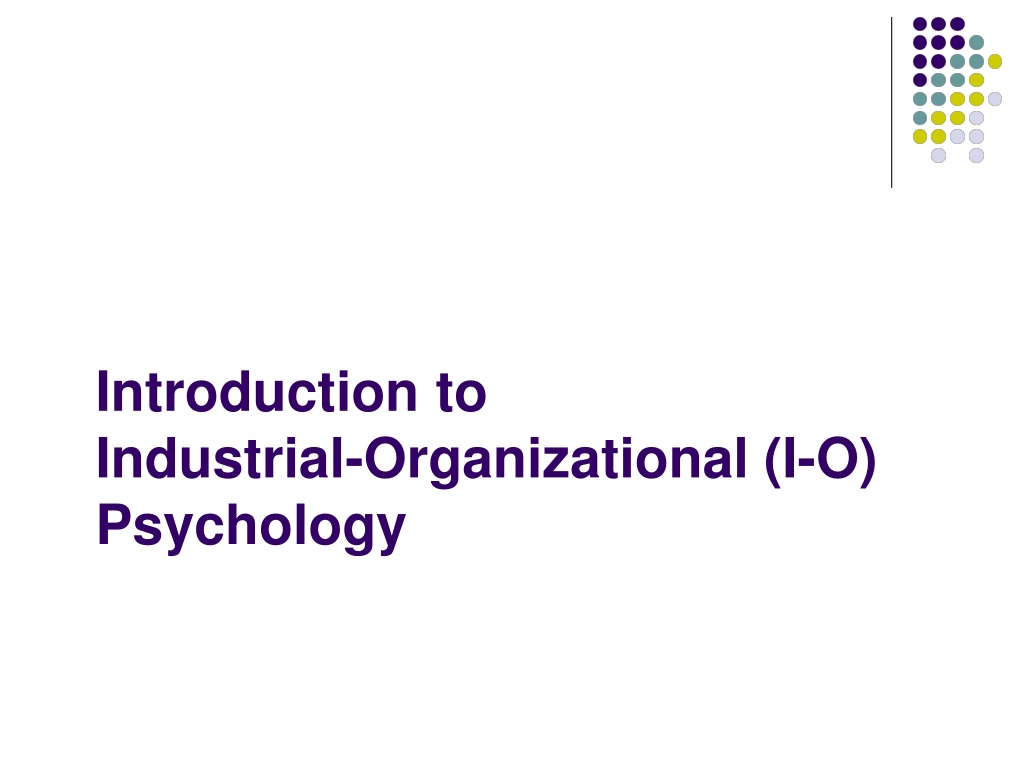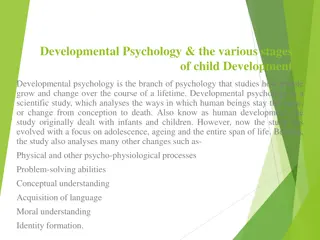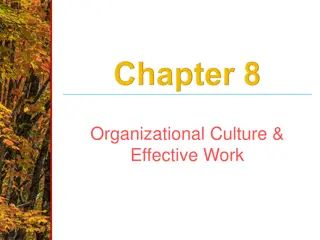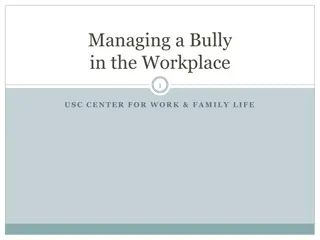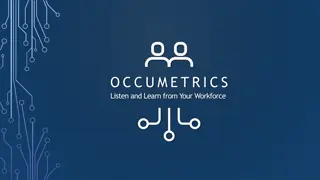Overview of Industrial-Organizational Psychology in the Workplace
Industrial-Organizational (I-O) Psychology focuses on studying behavior and mental processes in work settings, applying psychological principles to enhance work behavior. It covers various specialties such as industrial selection, training, performance measurement, organizational development, motivation, job satisfaction, and stress management. The field follows the Scientist/Practitioner Model, emphasizing both scientific research and practical application. The history traces back to the early 1900s with pioneers like Wilhelm Wundt, Frederick Taylor, and the Gilbreths, contributing to scientific management principles and time-and-motion studies.
Download Presentation

Please find below an Image/Link to download the presentation.
The content on the website is provided AS IS for your information and personal use only. It may not be sold, licensed, or shared on other websites without obtaining consent from the author. Download presentation by click this link. If you encounter any issues during the download, it is possible that the publisher has removed the file from their server.
E N D
Presentation Transcript
Introduction to Industrial-Organizational (I-O) Psychology
Why Study I-O Psychology? Work Large chunk of the day Largest period of adult life Often governs where we live how we live people we associate with The world of work and work behavior
What is I-O Psychology? Psychology study of behavior and mental processes (studi tentang proses mental dan tingkah laku) Industrial-Organizational Psychology study of behavior in work settings and the application of psychological principles to change work behavior (studi ttg. perilaku dlm seting dunia kerja, serta aplikasi prinsip2 psikologi utk merubah perilaku kerja) one of many specialty areas of psychology (salah satu dari cabang/area spesialisasi psikologi)
Specialization within I-O Psychology Industrial selection training performance measurement Organizational development motivation job satisfaction and stress more ...
Scientist/Practitioner Model Scientific Objective study and understanding of all aspects of behavior at work conduct research publish results Applied Objective application of psychological principles and the knowledge gleaned from research deal with specific problems/issues
History - Industrial Psychology Wilhelm Wundt 1st Psychology Laboratory (1879) Early 1900 s Walter Dill Scott W.L. Bryan Industrial Psychology Frederick Taylor Scientific Management Frank & Lillian Gilbreth Efficiency Experts
Scientific Management Use of scientific principles to improve efficiency and productivity of jobs Principle objective to maximize the prosperity of the employer and each employee Fundamental assumption interests of employees and employers are not antagonistic
Time-and-Motion Studies Procedures in which work tasks are broken down into simple component movements and the movements timed to develop a more efficient method for performing the tasks often doubled, tripled or even quadrupled labor output revolutionized physical labor jobs in terms of efficiency and productivity
History (continued) Hugo Munsterberg 1st book on psychology and industrial efficiency 1913 1st work simulation, Pittsburgh trolley drivers Max Weber classic book on bureaucracy World War I First wide spread use of testing in selection
World War I - testing Army Alpha intelligence test for selection and placement of military personnel (recruits) found over 1/4 of recruits were illiterate Army Beta non-verbal intelligence test for non-reading recruits First efforts at mass testing; lead the way for future testing efforts
1924 Hawthorne Works of Western Electric A positive change in behavior occurs at the onset of an intervention followed by gradual decline. Revealed the existence of informal employee work groups and their influence on production Identified the importance of employee attitudes and the value of an understanding supervisor
The Hawthorne Effect Changes in behavior occur as a function of one s knowledge that they are being observed and their expectations concerning their role as a research participant
Human Relations Movement (Organizational Psychology) Based on the Hawthorne studies (by Elton Mayo) that emphasizes the importance of social factors (informal processes) in influencing work performance. Worker morale Co-worker relations Social sources of motivation, especially in repetitive low level work
World War II (continued work begun in WW I) Army General Classification Test (AGCT) classified 12million soldiers based on ability to learn selection for officer training Pilot selection and training OSS (precursor to CIA) select spies based on situational tests intelligence, adaptability and creative thinking
Post World War II Specialty areas of I-O became more pronounced testing selection evaluation Defense industry growth spurred development engineering psychology human factors psychology ergonomics
50 s Ohio State Leadership Studies (Landmark in I-O) Structure task oriented leadership Consideration people oriented leadership Human Relations Movement (expanded) quality of work life job satisfaction
1960 s through early 1990 s Research and practice of I-O flourished motivation goal setting job attitudes organizational stress group processes organizational power and politics organizational development
1960 s Civil Rights and Women s Movements Legal changes - 1964 Civil RightsAct Emphasized fairness in employment decisions - Title VII Protects: race (ethnicity) color national origin (country) sex religion
1960 s and 1970 s Civil Rights and Women s Movements Prohibits: Discrimination in employment (hiring, firing, training ) Segregation Retaliation for filing Claims Administered by E.E.O.C. 1978 Uniform Guidelines developed
Cross Cultural I/O Psychology Diversity of Workforce Increasing diversity Women Ethnic minorities Opportunity for different viewpoints and perspectives organizational creativity and innovation understanding and reaching new markets By 2010 white males will count for less than 40% of the workforce
Cross Cultural I/O Psychology Scope of the Work Environment Globalization of business 100,000+ U.S. company do business overseas Jobs increasing in complexity Increased responsiveness to needs of workers
Cross Cultural I/O Psychology Other issues Mergers, acquisitions, and joint ventures International business environment cultural shock outsourcing High technology and telecommunication systems Internet influences
Changing Labor Market Tighter market for skilled workers recruitment (attract) selection retention retraining Growing numbers of low-skilled service jobs how can this work be made more meaningful?
Organizational Downsizing Strategy of reducing an organization s workforce to improve organizational efficiency, productivity and/or competitiveness technological advances robotics computer-assisted manufacturing reduction in mid-level management flatter organizations teams
Current Hot Topics Mergers, Acquisitions and Joint Ventures Influences of Technology Explosion Cultural Diversity Change Management Work and Family Balance Competency Modeling Teams
Industrial-Organizational (I-O) Psychology Today One of the fastest growing areas of psychology
I-O Psychologists Versatile behavioral scientists dealing with human behavior in the workplace Scientists who derive principles of individual, group and organizational behavior through research Consultants and staff psychologists who develop scientific knowledge and apply it in solving problems at work Teachers who train in both research and application of I-O Psychology
Four Main Work Areas of I-O Psychologists Academia Consulting Government 7% Industry 37% 38% 18%
Six Fields (specialization areas) Selection and Placement Performance Appraisal Training and Development Organizational Development Occupational Health Quality of work life Human Factors Psychology Ergonomics
Society for Industrial and Organizational Psychology (SIOP) Division 14 of the American Psychological Association (one of 53) www.siop.org The professional organization for I-O Info. Graduate programs Jobs Conferences Networking Publications
American Psychological Association (APA) largest professional organization for psychologists www.apa.org American Psychological Society (APS) alternative professional organization stressing a scientific focus www.psychologicalscience.org
Licensing in I-O Psychology Issues protection of public exclusivity of practice SIOP s current position not supporting licensing in I-O continual review of policy
Some Journals Publishing I-O Research Journal of Applied Psychology Personnel Psychology Academy of Management Journal Academy of management Review Journal of Applied Social Psychology Journal of Management Journal of Occupational Behavior Leadership Quarterly Organizational Behavior and Human Decision Processes Training and Development Journal
